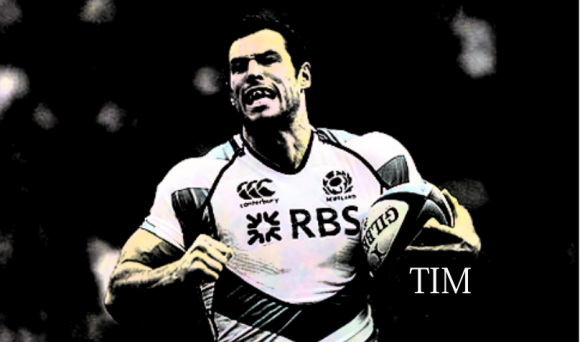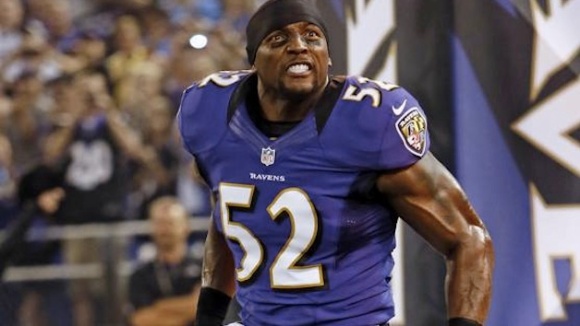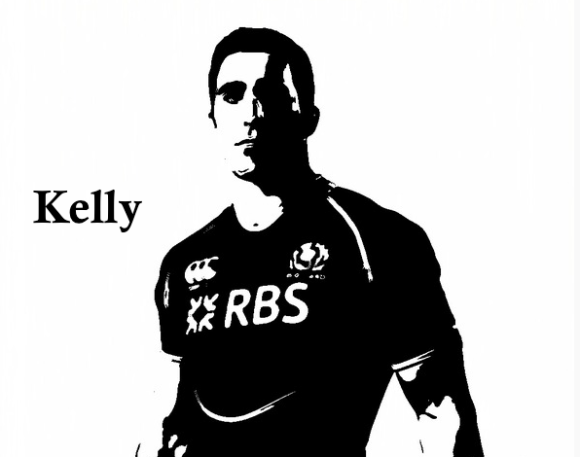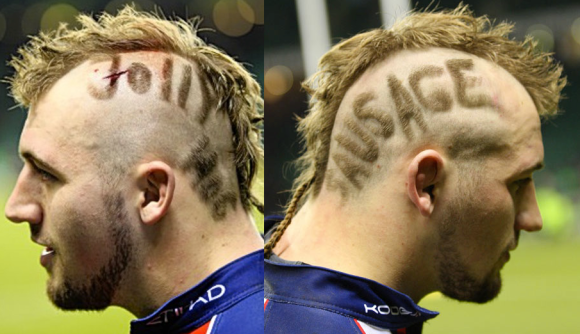This could very easily have been a post devoted to a shock Italian victory against England. The most unpredictable Six Nations of them all has made up for a distinct lack of entertaining rugby through sheer nerviness and left field results. Italy have been the architects of two of them, beating France and scaring the tweed off the Twickenham crowd on Sunday. The rugby world was almost turned on its head as the Azzurri piled into the English 22, seven points down and dashed English hopes of a Grand Slam nearing reality. Those closing moments were worth the bog-standard match we had been watching up until then, but England came through with only their egos dented and with zero tries scored to Italy’s one: 18-11.
That said, the 28 points racked up by Wales against Scotland‘s 18 (and those denied England by a resolute Italy) have whipped up an already excitable rugby nation into a country powered by nervous energy. What could have been a minefield at Murrayfield became a clear rallying cry to the Welsh team: homecoming, Cardiff, victory…
As for Ireland and France, the stalemate became even staler. Something of a relief for the French that they’d finally played a match in the championship and not lost, and worry for the Irish that they will now come up against the emboldened Italians at Stadio Olimpico. I wouldn’t dare be so brusque as to write off the Italians twice in a row (as George W. Bush famously said, you can’t get fooled again), but I also wouldn’t be averse to tipping the Irish to bookend the Six Nations strongly.
The only sadness is that the Six Nations will be over again for another year. There is no other sporting competition in the world that matches it for historical rivalry and just plain fun. That sadness will be short-lived, however, what with a certain Lions tour to come in a matter of months.
But the championship isn’t over just yet.
* * *
Italy v Ireland
Stadio Olimpico, Saturday, 2.30pm
Ireland trusted the return of Jonny Sexton would ensure they go out on a high after a dismal triumvirate of two losses and a draw. That was until he tore a tendon in his foot in a training session on Thursday. Who would have foreseen those abject results after they’d filled Wales in like an application form in the opening round?
A visit during the week from Lions coach Warren Gatland is said to have lifted the national camp’s spirits, which is ironic when you consider the jibes the Kiwi has thrown Ireland’s way over the years. Now that Gatland has his Lions hat on, though, his presence there (and the tour of Australia looming ever closer) might represent the kick they need. Playing for third is never the most inspirational of ambitions, but as individuals there is certainly much to play for. Was a visit from Warren Gatland all it took to reinforce that message?
Craig Gilroy, the Ulster wing and an Irish star on the horizon, looks set to make Irish hearts race once more. The absence of Tommy Bowe has been felt this year, not only for Ireland but for rugby fans everywhere. Gilroy, Bowe’s provincial teammate, looked set to fill that gap with his dazzling running ability, but he’s yet to get into his stride because of injuries.
For Italy, just as one talisman re-enters the fray, another departs. Number eight Sergio Parisse (back after his secondment to the naughty step for foul language) and tighthead Martin Castrogiovanni (out with the thigh injury he sustained early on against the English) have long been the two pillars of wisdom for the Azzurri, which will make Parisse’s job doubly hard against Declan Kidney’s chastened men. Which means we can count on him to pull up trees come tomorrow then.
* * *
Wales v England
Millennium Stadium, Saturday, 5pm
From famine to feast and back again. A graph of Wales’s achievements to date in the Six Nations looks like a landscape painting of the Himalayas: they’re either dwelling at base camp or raising flags at 9000m. Up until this year, Wales have come fourth in the rankings a grand total of six times, plunging lower on only three occasions: fifth in 2002 and 2007, and an ignominious sixth in 2003. Those dips were punctuated by 2005, 2008 and 2012 Grand Slams, meaning Wales have yet to take the spoils without beating every other team in the process.
This quasi-phenomenon is reflected in the attitude of the Welsh public, the majority of whom feared at the commencement of this Six Nations that their team would suffer a whitewash. Now, anything less than a tournament victory will be seen as a failure in their eyes, although this might just be down to the fact that it is England with whom Wales are vying for the title of Champions of Europe.
They say ‘you couldn’t have written better if you wanted to’. Well, you could: if Wales hadn’t been blitzed by Ireland in the opening round, then it would be Wales and England competing for the Grand Slam on the final day. As it is, it’s now a numbers game: Wales need to beat England by at least seven points -and beat them on tries- to be in with a chance of taking the number one spot which had seemed so improbable a matter of weeks ago.
This Six Nations championship has been England‘s to lose from the outset. Beating the All Blacks in the autumn effectively set the standard for this Six Nations: lose to Wales and 2013 will be seen as a backward step. A win at the Millennium Stadium -an unknown venue for many of the English contingent- would seal a first grand slam in ten years. Is the onus on the revitalised Welsh players to prevent England winning the slam in Cardiff for the first time ever? Or is it on England to deliver on the promise they’ve shown post-World Cup blues? While English pundits would have you believe otherwise, the pressure is almost certainly on England. They beat the All Blacks, after all, while Wales failed to see off Samoa and Argentina.
Two young teams with many years in the sport to come face off in Cardiff tomorrow: it is Act Two in what is set to be an epic saga of cross-border rivalry. If Wales do pull off the mother of all Six Nations wins, it will be their finest hour thus far because of the dismal nature of their journey there. They entered the competition with seven losses on the trot, and have lost their last five home matches. Win tomorrow and in ten years’ time schoolboys with names such as George and Leigh will be hustled out of their house on a cold Saturday morning by their rugby-mad dads to re-enact Saturday 16th March, 2013.
Jamie Roberts and Jonathan Davies, appearing together a record 17 times in the Welsh midfield, will have a huge part to play against an equally robust unit of Brad Barritt and Manu Tuilagi. It goes without saying that this contest hinges on what damage both sides’ respective packs can do to one another. Rarely has there been an occasion on which Wales’s lineout has outshone England’s, and this area has been a constant bugbear for successive Wales coaches. Predicting whose scrum will emerge victorious is a less straightforward exercise, given that referees have as much idea about what’s going on inside that clash of 16 monsters as they do the ‘God particle’.
In another laudable feat, Mike Phillips becomes Wales’s most-capped scrum-half this weekend, and the occasion is entirely suitable for a man who lives for the dogfight. If ever there was somebody you wanted alongside you in the trenches, it is Phillips. He might have the looks of a Mediterranean playboy -and who can forget Bakkies Botha complimenting Phillips’s “sexy blue eyes” in the heat of the battle?- but Phillips has the ability to grab the game by the scruff of the neck when all around him are floundering. Moments such as that infamous match against France in the 2011 World Cup when, down to 14 men, Phillips set off on a try that damn near brought the win (and justice) to Wales. Or another from that year’s Six Nations, when Phillips narrowly escaped the attentions of Tommy Bowe to score a try with ‘the wrong ball’.
He’s come a long way since his burgeoning days as a Scarlet, Blue and Osprey (who can even remember all the clubs he’s played for?). Rumour had it that he was once sat down by Kiwi rival and fellow Ospreys scrum-half Justin Marshall during training, and maybe that taught a then-25-year-old Phillips respect his elders – but probably not. Such dust-ups are to be expected when you have two similar characters struggling for the same position. Phillips will soon share the same distinction as Marshall, a fiery contender who broke the All Blacks record for appearances at nine, as well as experiencing run-ins with the police for fighting.
(Incidentally, Marshall was back in the Welsh eye this week, having opened a new hotel in Laugharne, the Carmarthenshire home of Dylan Thomas, and roughly 10 minutes from where Phillips was born and bred. A Western Mail reporter somewhat harshly described the All Black legend as “known during his rugby career for his bleached blond hair.” That’s all he was known for then!)
A friend tells a witty story about witnessing Phillips being approached at a cash point by an overly-boisterous rugby fan on a night out in Cardiff (a city where the scrum-half has been known to raise hell quite publicly). The fan sidles up to Phillips at a cash point and says: “Mike, I’ve heard you’re a right p****.” To which Phillips responds swiftly (maybe he’s used to hearing this): “Have you heard of the Loch Ness Monster?” Fan: “Yes…” Phillips: “Well, don’t believe everything you hear.”
* * *
France v Scotland
Stade de France, Saturday, 8pm
Clive Woodward and Phillipe Saint-André’s recent tete-a-tete has enlivened what has been an execrable French campaign. The French coach (who oversaw Sale Sharks’s 2006 Premiership win) is in such a semi-untenable position that he is now lashing out at his detractors. Okay, that’s a classic example of sensationalism -Saint-André probably calmly answered a journalist’s question- but you catch my drift.
Saint-André rebutted Woodward’s criticism of his selection policy (read: Frederic Michalak) by saying: “For the past four or five years our friend Clive Woodward has been involved in athletics. He is no longer involved in rugby … When he began his job he left for Australia with a very young squad, and they lost by between 70-80 points. He didn’t win many matches at the beginning, but he believed in his players and they were world champions in 2003.” If you were in a facetious mood, you’d point out that the French, with a very similar team, have already pumped Australia prior to this Six Nations, but that would be belabouring a point that has already been ignored to death by everyone.
It is Thierry Dusautoir, one of the game’s true gents and the epitome of a team leader, for whom we should feel sorry. There are not many who would take pride of place in a Dream XV back row of the last eight years, but he would be there or thereabouts. His unwavering effectiveness in all he does has set the standard for back-row play in Europe. Dusautoir has thanked the French fans who followed their team to Dublin and were audible throughout, whilst at the same time admitting that everybody will soon forget France’s 2013 Six Nations. That said, if France fail to end the championship on a high at the Stade de France, it is the deafening boos of the crowd that will live long in the players’ memories.
While Scotland give a first cap to 22-year-old second row Grant Gilchrist, France pitch him against newcomer Sebastien Vahaamahina, 21, who featured from the bench in that Australia win and, more recently, for 20 minutes against the Irish. Edinburgh’s Gilchrist already has experience of beating France’s top teams, having played in the Heineken Cup victory over Toulouse. Vahaamahina will have good knowledge of Scotland blindside Alasdair Strokosch, his teammate at Perpignan.
Serge Blanco and Christian Califano will present the jerseys to the team on the morning of the match: two former internationals who will be thinking long and hard about what to say to this band of beaten men. To put a perspective on shifting fortunes, in the past Scotland have lost many of the matches they should have won, and it is only fair -if there is such a thing in professional sport- that they should come good this year against Ireland and Italy.
After the implosion of the Scottish pack against the Welsh at Murrayfield (Scott Johnson would have us believe that his men were ‘conned’ by ‘diving soccer players’), the Gallic forwards will be itching to see if they can get equally stuck into Messrs Grant, Ford and Murray: a stage from which they can then launch the menacing talents of Wesley Fofana (scorer of the best try of the tournament against England) and Mathieu Bastareaud in the centre – and that’s before you look at who they have outside them. Maxime Medard and Vincent Clerc are the archetypal flair wingers, while Yoann Huget at fullback is one whose stocks and shares have soared in what has been an otherwise depressing month or so for France.
Can we finally see some running rugby in this year’s Six Nations?
* * *
HORSING AROUND DOPING SCANDAL (CONTINUED)
We’ve all had enough of the shockingly bad horse puns over the last month or so, but the goings-on Down Under could be making a strong case for their revival. Last week we covered the NRL drugs scandal and how the actions of certain senior players within the Cronulla Sharks weren’t doing their cases any favours.
Lo and behold, Wednesday morning came the news that Sharks chairman David Irvine had resigned; this along with the manager, head trainer, doctor and physio being sacked, while coach Shane Flanagan was ‘stood down’. Australian reports indicate that Irvine resigned under pressure resulting from comments he gave about the Sharks’ former sports scientist, Stephen Dank, whom Irvine claims injected his players with equine steroids in 2011.
If horses weren’t enough, enter ‘the Gazelle’ aka Darren Hibbert, chief supplier of Dank’s sports nutrition supplements. (The laymen among you might think of protein bars when you hear the term ‘sports nutrition supplements’, but here it implies substances that make racehorses stronger and faster. Nothing you can nip into Boots to buy, then.)
Some NRL players from various clubs have apparently been buying supplements directly from the back of Hibbert’s car, which is an interesting twist on the ol’ car boot sale. Something suggests we’ve only scraped the surface of this beast of a scandal.
RUNAWAY INJURY
In this excerpt from an interview with the great Men’s Journal magazine in the United States, NFL legend Ray Lewis explains the ‘worst physical pain you’ve experienced’:
“My hamstring being torn from my butt bone. This was 2004, and we were playing the Bears. I’m running toward the sideline at Thomas Jones, and I tried to pull up and pow! Oh, my goodness! It was like a gunshot. I threw my hand in the sky and just pointed to my sideline, like, ‘Meet me in the locker room because I’m done’. I remember that after that surgery, using the bathroom was the most challenging thing ever. My mom had to help me, which was embarrassing, so I just wouldn’t eat.”
Let’s sing it together now: “The hamstring’s connected to the… butt bone!”




























